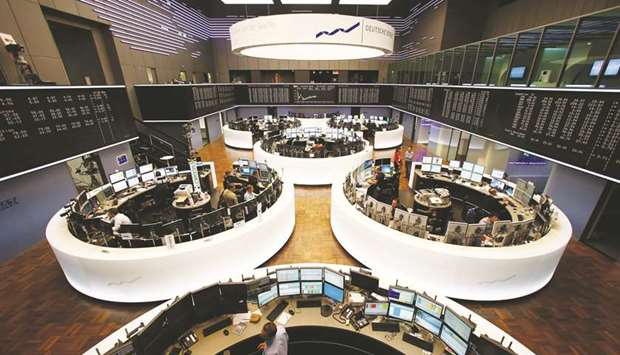European stock markets mostly ended the week lower as investors were disappointed by the failure of US lawmakers to agree a new stimulus deal, and were spooked by surging virus infections.
London ended the day with a small gain, however, and in midday New York trading, the Dow Jones index had also moved back into positive territory after a weak start.
In London, the FTSE 100 closed up 0.3% to 5,842.67 points; Frankfurt — DAX 30 ended down 1.1% to 12,469.20 points; Paris — CAC 40 closed down 0.7% to 4,729.66 points and EURO STOXX 50 ended down 0.9% to 3,132.36 points yesterday.
The dollar climbed against its main rivals, while oil prices dropped.
“The same old issues are holding these markets back, considerable economic and political uncertainty — particularly in the US — worrying Covid trends in Europe and a lack of new fiscal and monetary support measures in Washington,” said Oanda analyst Craig Erlam.
“Sentiment is fragile, and it’s been a turbulent week,” said Neil Wilson, chief market analyst at Markets.com.
The need for a new stimulus deal was highlighted by data that showed US jobless claims rising rather than falling last week as a recovery in the world’s top economy stumbles ahead of a fraught presidential election.
US durable goods orders posted tepid growth of 0.4% in August, meanwhile, well below the revised level in July of 11.7%.
Aneta Markowska at Jefferies LLC said it was “a close call” on whether a new stimulus would be agreed, adding: “While still possible, there is a high risk that it does not happen this year.
“Without it, we would expect the economy to hit a major speed bump in the fourth quarter.”
A surge in coronavirus infections in Europe has resulted in governments imposing partial lockdowns and social restrictions.
Two British supermarket chains are also now rationing certain products to avoid panic-buying seen earlier this year.
“At this point in the recovery, a return to the Covid-19 abyss due to stricter lockdown measures is quite frankly something the global economy cannot afford,” said Stephen Innes at AxiCorp.
Europe’s steady start morphed into gradual and then more meaningful selling. The region’s bank index hit a new record low, oil and gas stocks were down more than 6% for the week, and a sea of red on US futures markets meant September was set to be the worst month globally since March’s maelstrom.
There had been a flicker of hope overnight after squabbling US political parties had at least talked about another super-sized stimulus package, but the rise in the dollar and demand for safe US and German government bonds remained telling.
The relapse in sentiment has hit emerging market debt, especially countries with weak credit ratings, like a wrecking ball.
Argentina’s newly restructured bonds have lost around 25%, making it the worst return to markets since Greece in 2012 while plenty of other countries have seen 10% hammerings.
“It has been a very interesting week” said Saxo Bank’s head of FX strategy John Hardy. “We have seen the dollar come back and what is interesting this time is that there also some element of dollar liquidity stress in it again.”
He said the talk of more US stimulus ahead of the November presidential election was likely to just be “show boating” especially with a fierce battle over a seat on the Supreme Court now thrown into the mix.
“I just can’t see anyway that the Democrats can make a deal here with this endgame into the election...It’s dirty politics all the way now”.
On Wall Street overnight, the Dow Jones Industrial Average rose 0.2%, the S&P 500 gained 0.30% and the Nasdaq Composite added 0.37%.
While the economic picture in the US remains clouded, the strongest sales of single-family homes in nearly 14 years in August helped to revive some faith in the recovery.
It helped nudge the benchmark 10-year US Treasury yield up to 0.6725% from a close of 0.664% on Thursday.
German Bunds ticked up to -0.5% on the day too, but were set for a weekly drop as the growing number of coronavirus cases in Europe fed demand for safety.
In the currency markets, the dollar was hovering near Thursday’s two-month highs, at 105.40 versus the yen and pushing the euro down to $1.1656, on course for its worst week since the end of March/start of April.
China’s yuan also made gains after the country’s government bonds gained long-awaited entry into one of the world’s most coveted bond benchmarks, the FTSE Russell WGBI.
For most emerging markets it has been a brutal week though, with some double-digit bond market falls for the weakest countries, the worst week since March for stocks and 4%-5% drops for Mexico’s peso and South Africa’s rand.
“It has been a very sharp correction this week,” said Pictet Asset Management portfolio manager, Robert Simpson. “What the pickup in Covid cases has done is probably brought forward the reduction of risk going into the US election.”
The dollar’s strength this week has also battered commodities, with gold set for its worst week in more than a month.

Traders monitor data on computer screens at the Frankfurt Stock Exchange. The DAX 30 closed down 1.1% to 12,469.20 points yesterday.
